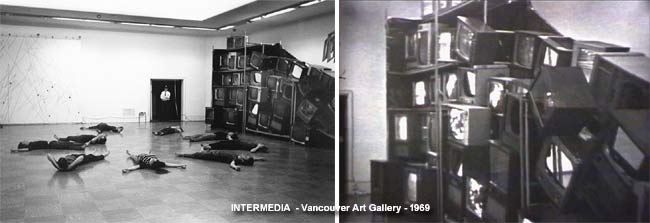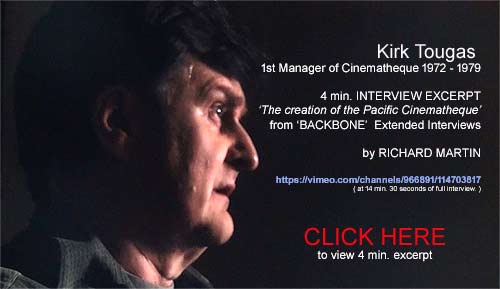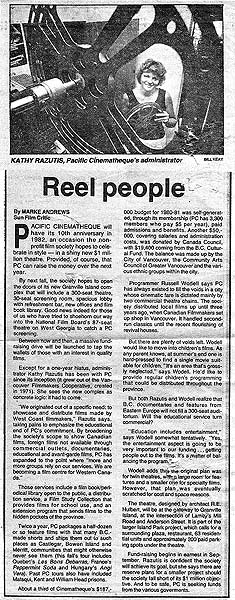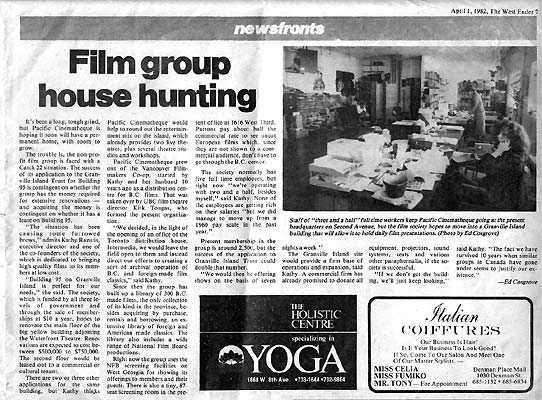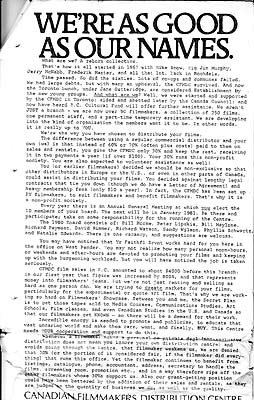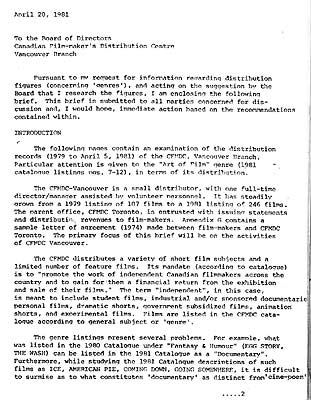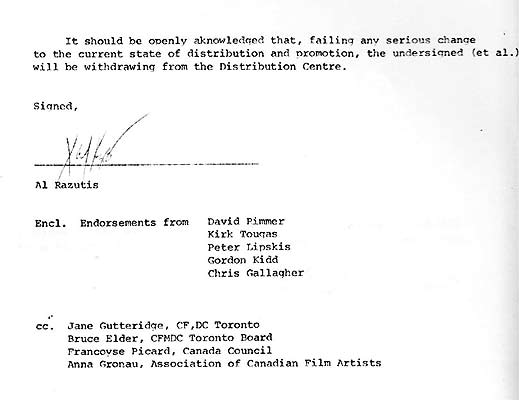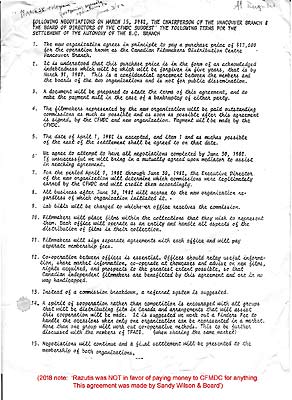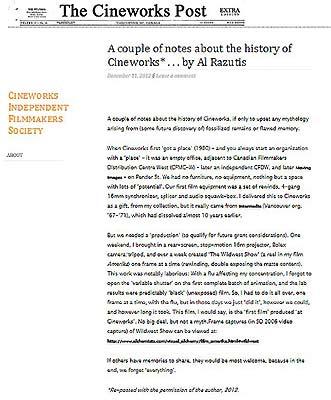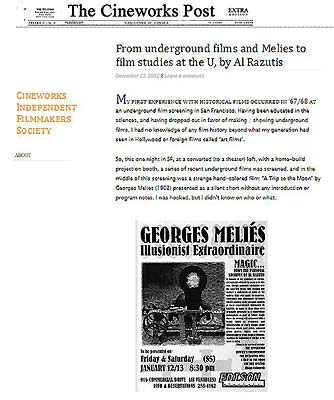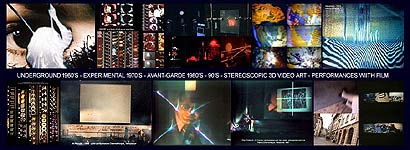INTERMEDIA & BEYOND INTERMEDIAEMERGENCE OF INSTITUTIONS: 'CINEMATHEQUE', 'CFDW' - 'MOVING IMAGES', 'CINEWORKS' VANCOUVER"Intermedia Vancouver was first and foremost a place experimental media""This was a time of underground, experimental, electronic culture, where film and video began to merge, where separate art disciplines experimented with collaborating with content, experimented with the audience, and where concepts like 'synergy', 'expanded cinema', 'multi-disciplinary', 'electronic' and 'intermedia' came about in many art communities around the world. BACKGROUND: "Werner Aellen came from the NFB (Montreal) film and with an architectural background, and when he came to Intermedia in 1968 (as its first Director) it made a grant (40K) possible from the Canada Council. Why? Because the CC was NOT going to give 'Intermedia' a grant until it had some 'management' some 'structure' some 'accountability'. Forget the stories of Dennis Vance (living there) 'holding it all together'... forget hippies and us twenty-somethings (who said "don't trust anyone over thirty") being trusted with government money. "So Werner, and Joe Kyle, David Orcutt, Bud Doray, Jack Shadbolt, Tony Emery (VAG), Bill Nemptin and other people became the 'elders' who helped facilitate all this experimentation, and freedom.
Intermedia was open to ALL! Including us American expatriates. And all came (dancers, poets, film makers, sculptors, painters, and artists of all kinds), and we interacted, and it was free... and I ran weekly 'underground movies', charged a dollar admission, kept the gate because nobody cared if it made or lost money.
History Quotes from 'INTERMEDIA CATALOGUE' by Michael de Courcy - http://intermedia.vancouverartinthesixties.com/ "Intermedia opened its doors in the spring of 1967. The idea of creating a society and a public workshop dedicated to the collaborative exploration of new technologies by artists had been the brainchild of a local alliance of artists, poets, musicians, dancers and academics. This group originally assembled to discuss Marshall McLuhan's theories on how electronic media, particularly television, was transforming our world into a "global village". There was the strong feeling that artists should be at the vanguard of this radical reshaping of society. "It is our intention that Intermedia be a place where creative exploration could take place on an interactive basis between artists, between technologists and between seriously interested people. The only criteria that we have is that it is far out, creative and exploratory." "I don't think it's very desirable to try and define Intermedia in too great detail at the moment because it's exploratory – we are, in a sense, discovering this thing into existence." "We have tried in the setting up of this to create as unstructured an environment as possible. This is the essential difficulty involved in working within an existing institutional structure." – Victor Doray and Joe Kyle on CBC radio in 1967
"If it had to become more institutional we would pull the plug." "Initially I was intended to put the destruct button into the system should it ever get to be too established and too successful because that would contravene the whole concept of exploration." – Werner Aellen (from 'Vancouver Art and Artists in the 60's') CLAIMS & COUNTERCLAIMS:
"
There wasn't the intent that there be evidence. Much of the art production at Intermedia centered around the creation of environments and participatory installations. Objects were being made, but even then these were often shuttled around the city and used in interventions or as "props" for photographs. There was a great deal of interest in time-based projects - first film, and later on video. Much of the activity was conceptually-based and process-oriented. The artworks were those things that were happening minute by minute – interpersonal stuff, performance, poetry and dance. It was ephemeral. The process could be initiated purely for the camera, with no real product being created other than the pictures themselves. COUNTER CLAIM: "The above statements by de Courcy and Dennis Vance I call out as BUNK. This is nonsense that is being offered as substituting for the facts and the evidence of all the groups that came afterwards from Intermedia itself. The idea that a 'intermedia' of electronic medias, performers, performances and interdisciplinary activities were 'shuttled around the city and used in interventions or as props for photographs' might have suited some 'conceptually minded people in the minority' but this was not the purpose of intermedia to be a 'playpen' or a 'prop' for some guys later ending up teaching in art schools. This has to be called out. It is BUNK, and they've had enough decades by now at it." -- Al Razutis
NOTE: Due to the scarcity of 70's recorded and remaining material (images), this archive is an in-progress work and is intended as a factual supplement to biographical material. We gratefully acknowledge the personal archives of Werner Aellen (Director of Intermedia) and the public domain archives of "Intermedia Catalogue" assembled by Michael de Courcy - also under the title 'Vancouver Art in the 60's' from which we have obtained a few photos, audio and news articles and have placed credit where appropriate. From Intermedia to the creation of the Cinematheque'GREATER VANCOUVER FILM CO-OP' becomes 'PACIFIC CINEMATHEQUE PACIFIQUE'Werner Aellen (Director of Intermedia) and Tony Emery (Director of Vancouver Art Gallery) create the 'Pacific Cinematheque Pacifique' Vancouver from the legacy organizations Greater Vancouver Film Co-op and Intermedia Film Co-op models before. Documents authored and signed by founders, officers, directors -- 1970 - 1972 -- click to enlarge in separate window Later docs witnessed by 'Secretary for the meeting' and first PCP 'Manager': Kirk Tougas 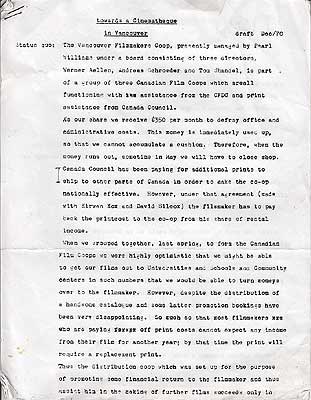

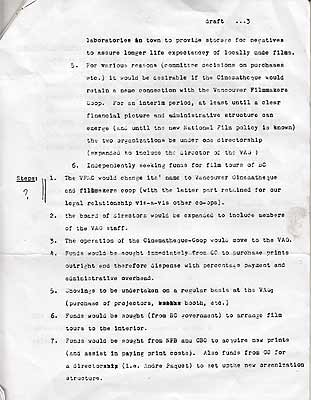
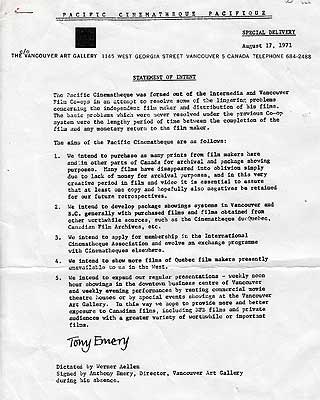
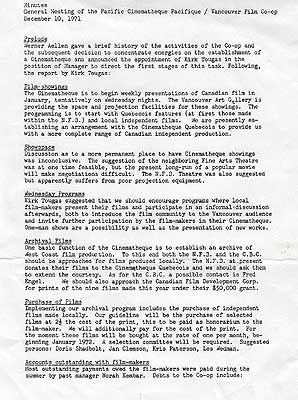
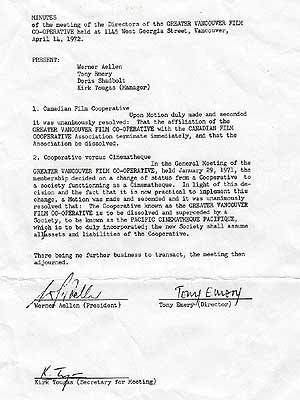
A CONTRASTING VIEW - A DIFFERENT TALE OF CREATION:
Excerpt from Kirk Tougas depiction of the creation of the Pacific Cinematheque, recorded in Richard Martin's "Backbone" Extended Interviews -- at 14 min. of https://vimeo.com/channels/966891/114703817 ), where he says: "The opportunity for the creation of the Pacific Cinematheque came to be... (cut)
it was some people in Vancouver who realized that film was an important medium, who could tell that the American machine was the only game in town...
(cut)
There was a few people like Tony Emery at the Vancouver Art Gallery,
there was an architect by the name of Werner Aellen who was kind of consulting for the Canada Council... and a few other people who said 'Hey, we need some sort of film venue.' They didn't exactly know what but they wanted that.
(cut)
I said sure, we can do this. I mean I was... I think I was twenty-one...
(cut)
(Laugh) Seventy one is when I started. The Cinematheque was actually incorporated in seventy two... (a rambling discussion continues..) I actually put in nine years creating the cinematheque" THE PACIFIC CINEMATHEQUE IN THE 1980's
CREATION OF OUR OWN VANCOUVER FILM DISTRIBUTOR 1980's Al Razutis, an alumnus from the INTERMEDIA FILM COOP secured the interest and assistance of other Vancouver experimental filmmakers in 1981 (Rimmer, Tougas, Lipskis, Kidd, Gallagher) to demand reforms, creation of Experimental Film Officer, and later independence from "Canadian Film Makers Distribution Centre". In 1981 Mr. Razutis was on the 'board' of the CFDC - West (subsidiary of Toronto) under NATALIE EDWARDS, and after Mr. Razutis studied the books and distribution preferences of the organization he decided to 'stage a coup' and remove Ms. Edwards and declare independence from Toronto.
With reference to INTERMEDIA FILM CO-OP - Vancouver, 1968-71
Intermedia Film Catalogue - complete - PDF (35mb pdf file) CREATION OF OUR OWN VANCOUVER INDEPENDENT FILM PRODUCTION CO-OP 'CINEWORKS', 1981 The same alumnus from the days of INTERMEDIA FILM COOP Al Razutis, now a tenured university professor secured the interest and assistance of other Vancouver experimental filmmakers in 1979-81 (Kidd, Rimmer, Lipskis,) to participate in a government-funded independent filmmakers society to be named later in 1981 Cineworks Independent Filmmakers' Society and even later be the subject of myth-making on the part of those who weren't there. STORIES OF CINEWORKS & FILM STUDIES
Historical texts as reference: Back to: Forward to:
Drawing on Film - Video Archives
[HOME PAGE]
|

